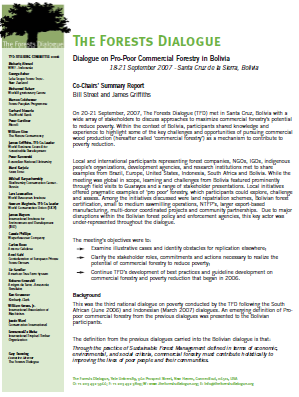Co-chairs’ Summary : Dialogue on Pro-Poor Commercial Forestry in Bolivia
On 20-21 September, 2007, The Forests Dialogue (TFD) met in Santa Cruz, Bolivia with a wide array of stakeholders to discuss approaches to maximize commercial forestry’s potential to reduce poverty. Within the context of Bolivia, participants shared knowledge and experience to highlight some of the key challenges and opportunities of pursuing commercial wood production (hereafter called ‘commercial forestry’) as a mechanism to contribute to poverty reduction.
Local and international participants representing forest companies, NGOs, IGOs, indigenous people’s organizations, development agencies, and research institutions met to share examples from Brazil, Europe, United States, Indonesia, South Africa and Bolivia. While the meeting was global in scope, learning and challenges from Bolivia featured prominently through field visits to Guarayos and a range of stakeholder presentations. Local initiatives offered pragmatic examples of ‘pro poor’ forestry, which participants could explore, challenge and assess. Among the initiatives discussed were land repatriation schemes, Bolivian forest certification, small to medium sawmilling operations, NTFP’s, larger export-based manufacturing, multi-donor coordinated projects and community partnerships. Due to major disruptions within the Bolivian forest policy and enforcement agencies, this key actor was under-represented throughout the dialogue.
The meeting’s objectives were to:
- Examine illustrative cases and identify obstacles for replication elsewhere;
- Clarify the stakeholder roles, commitments and actions necessary to realize the potential of commercial forestry to reduce poverty;
- Continue TFD’s development of best practices and guideline development on commercial forestry and poverty reduction that began in 2006.

